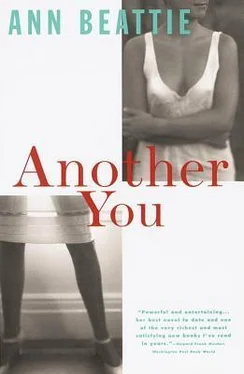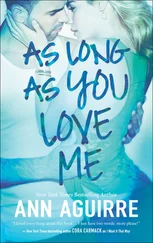Ann Beattie - Another You
Здесь есть возможность читать онлайн «Ann Beattie - Another You» весь текст электронной книги совершенно бесплатно (целиком полную версию без сокращений). В некоторых случаях можно слушать аудио, скачать через торрент в формате fb2 и присутствует краткое содержание. Год выпуска: 2014, Издательство: Vintage Books, Жанр: Современная проза, на английском языке. Описание произведения, (предисловие) а так же отзывы посетителей доступны на портале библиотеки ЛибКат.
- Название:Another You
- Автор:
- Издательство:Vintage Books
- Жанр:
- Год:2014
- ISBN:нет данных
- Рейтинг книги:5 / 5. Голосов: 1
-
Избранное:Добавить в избранное
- Отзывы:
-
Ваша оценка:
- 100
- 1
- 2
- 3
- 4
- 5
Another You: краткое содержание, описание и аннотация
Предлагаем к чтению аннотацию, описание, краткое содержание или предисловие (зависит от того, что написал сам автор книги «Another You»). Если вы не нашли необходимую информацию о книге — напишите в комментариях, мы постараемся отыскать её.
Another You — читать онлайн бесплатно полную книгу (весь текст) целиком
Ниже представлен текст книги, разбитый по страницам. Система сохранения места последней прочитанной страницы, позволяет с удобством читать онлайн бесплатно книгу «Another You», без необходимости каждый раз заново искать на чём Вы остановились. Поставьте закладку, и сможете в любой момент перейти на страницу, на которой закончили чтение.
Интервал:
Закладка:
“Take it easy you don’t exhaust him,” Marshall called.
“He’s doing!” the girl laughed, continuing to run.
That wasn’t exactly what the girl meant, either, he thought. But if he thought too much, he’d be in a state of despair.
“Way to go!” he hollered, with false cheer.
“I’m like wiped,” the girl screamed back.
So was he. And he would be glad to return to his house, and to his adult wife, Sonja, who was so fluent in English.
Dearest Martine ,
What was I thinking of? I do not, myself, want a dog! That is the simple truth. Lately I have found myself engaged in speculative thought that later seems quite perplexing .
Apropos my last letter: Do you think that sending a note to the Burks might persuade them to come to dinner another night? Might they return to the area specifically to see us, even though they will have relocated to Washington? I would ask them myself, but I know that she, in particular, is so fond of you that I think you might succeed better .
Am I being too overbearing, planning so far ahead? If so, ignore this note entirely, and I will contact the Burks myself once we’ve returned .
Fondly ,
M .
4
WITH THE NEW aluminum snow shovel in the trunk, her felt-lined boots pulled off and placed to drip on the floor of the passenger’s side, wearing wool socks and flats with crushed heels that she kept in the car and used as driving shoes, Sonja pulled out of the driveway and bumped carefully into the narrow channel cleared by the snow-plow, reaching up to flip down the visor, moving her hand to the tape deck to click in the cassette and hear the rest of the Claudio Arrau recording she had begun to listen to the day before. On the seat beside her was a canvas bag filled with things she thought Evie might want or need: lotion, magazines, new underpants, cookies. The drive to the nursing home took about an hour, and though Marshall had offered to drive her to see his stepmother this coming Saturday, she decided she’d been housebound too long; the drive would do her good, as well as cheering Evie. And now she was being rewarded by Claudio Arrau playing Chopin. The music was as clear and direct as the channel the snowplow had pushed open — the sort of music, she thought, that made you aware that other possibilities surrounded it, music that suggested a physical place, where unheard tones might be as real as heaped snow.
Evie had smoked three packs a day until she had a stroke. Six cigarettes a day until, a year later, she had the second. Now she begged an occasional cigarette from the male night nurse, entered into somber-faced agreements with the doctor that such transgressions would stop. It was so difficult to come to terms with: fashionable Evie, with her once neatly permed hair, become a streaming-haired witch in layers of clothes as odd as the things teenagers wore at the mall: pleated skirts over skinny trousers; tights with rolled anklets; mismatched cardigans and blouses that dangled beneath the sweaters. Her conversations were equally dishevelled: ragged references to things in the present; slightly strange diction, so that the Queen of England became the London Queen, as in: What do I care how I look? It’s not as if the London Queen’s coming for a visit. Annus became “anus” as Evie summarized the London Queen’s travails for Sonja: O bad year of fires, marriages gone wrong, the doe eyes of her middle son’s babies bug-big in the camera’s flash, their redheaded mother smiling, her white teeth orthodontically straight, though her life had wavered. Much cleavage; a cuckolded husband; publicly nibbled toes.
Sonja, herself, was certainly not the London Queen. In fact, though her blue earmuffs had become her favorite winter hat, they were not coordinated with her camouflage boots and, unlike the Queen’s old-lady handbags with their small handles — handbags ladies hold the way children hold buckets of wet sand at the beach — the black leather bag with the drawstring Sonja carried slung over her shoulder had lasted over fifteen years. Once, among the sunken treasures on the handbag’s linty bottom, there had been a rather large zippered makeup bag, now replaced by a smaller quilted bag. When the black mascara dried up, Sonja had not replaced it. The bronze eyeliner had gotten lost somewhere; when she could not find the same shade, she had replaced it with dark blue. Now the makeup bag contained only a small bottle of aspirin, a stub of blue eyeliner. Tampons had taken over. Once the handbag had been a treasure trove of things she found necessary and interesting: compact corkscrews; miniature bottles of perfume; keys to many people’s apartments; photo books crammed with pictures of herself and her boyfriends, later a small foldout book of her wedding pictures, soon overlaid by pictures of friends’ children. Now the purse contained a travel-size package of Kleenex, and usually a few coupons floated around like buoyant bits of driftwood, along with deteriorating peppermint Life Savers and rumpled bills she’d forgotten to mail. The Mont Blanc fountain pen she had practiced writing her married name with over and over was long gone, lost somewhere, replaced by a felt-tip. Her wallet contained a single photograph of Marshall. On the flip side of the rectangle of clear plastic was her AAA card. She also had one credit card — one more than she vowed she would ever have — which she kept tucked in a separate compartment in her wallet so she wouldn’t be tempted to pull it out. On one corner was a hologram of a bird that flashed spectral colors and appeared to be flying as you jiggled the card. It seemed more suitable as an element of a mobile that might dangle over a child’s crib than as a plastic symbol of your own potential flights of fancy that could dazzle all the while you were depleting your bank account.
She was, she realized — with the notable exception of her involvement with Tony Hembley — rather conservative. A practical person who thought that if something was serviceable, it didn’t need to be replaced. And she had believed in recycling long before it became popular. Old tie-dyed T-shirts had been stitched into colorful foam-filled animals and donated to the church bazaar; trading beads she would no longer wear had been unstrung and added to light-pulls; embroidered free-flowing dresses had become summer nightgowns. Though maybe, come to think of it, it wasn’t judiciousness so much as a desire to make the past fit in with the present. Though it surely couldn’t be dovetailed, perhaps the past could at least unapologetically sidle up beside the furniture or clothes or philosophy of the present moment.
What, she wondered, had put her in this suddenly philosophical mood — especially on a day when the music she was listening to perfectly augmented the melting world outside, when she was driving familiar roads for familiar reasons? She thought, as Arrau softly played the notes whose near echo of sameness was the ending of the piece, that she must have subconsciously selected music that sounded haunted. It was the sound track for the morning after, music to soothe the sometimes-mad, adagio as antidote to a difficult day.
She passed the dry cleaner’s and forgot until she was at the intersection that she’d left clothes there she needed to pick up. She envisioned her recent progress in reverse: she couldn’t stop the mental image of her car turned back past the dry cleaner’s, retracing her route on Locust Avenue, which curved into Daymer Drive, then the turn onto snowy Hollowell Road, backtracking all the way to her driveway. And then what? Reenter the house and retrace her steps, return to the point where she was still curled in bed, snug and sleepy — act as if she had no obligations? After the visit to the nursing home, she would be driving to UPS to mail a box of clothes to the family in Appalachia she and Marshall sponsored, and after that she would try to get the car washed before buying groceries. One good thing about winter was that groceries could be left safely in the car for long periods while she did other things. She could leave them there and get on the highway and drive half an hour to Hembley and Hembley, find out if she was scheduled to show a house, then listen to the phone messages, hope that the one contract she had in the works was progressing without trouble, check the listings to see if anything had sold (not likely; in her position, it wasn’t necessary to keep posted on all the hysterical cover stories in the magazines, informing everyone that the boom days of ’80s real estate were over).
Читать дальшеИнтервал:
Закладка:
Похожие книги на «Another You»
Представляем Вашему вниманию похожие книги на «Another You» списком для выбора. Мы отобрали схожую по названию и смыслу литературу в надежде предоставить читателям больше вариантов отыскать новые, интересные, ещё непрочитанные произведения.
Обсуждение, отзывы о книге «Another You» и просто собственные мнения читателей. Оставьте ваши комментарии, напишите, что Вы думаете о произведении, его смысле или главных героях. Укажите что конкретно понравилось, а что нет, и почему Вы так считаете.












